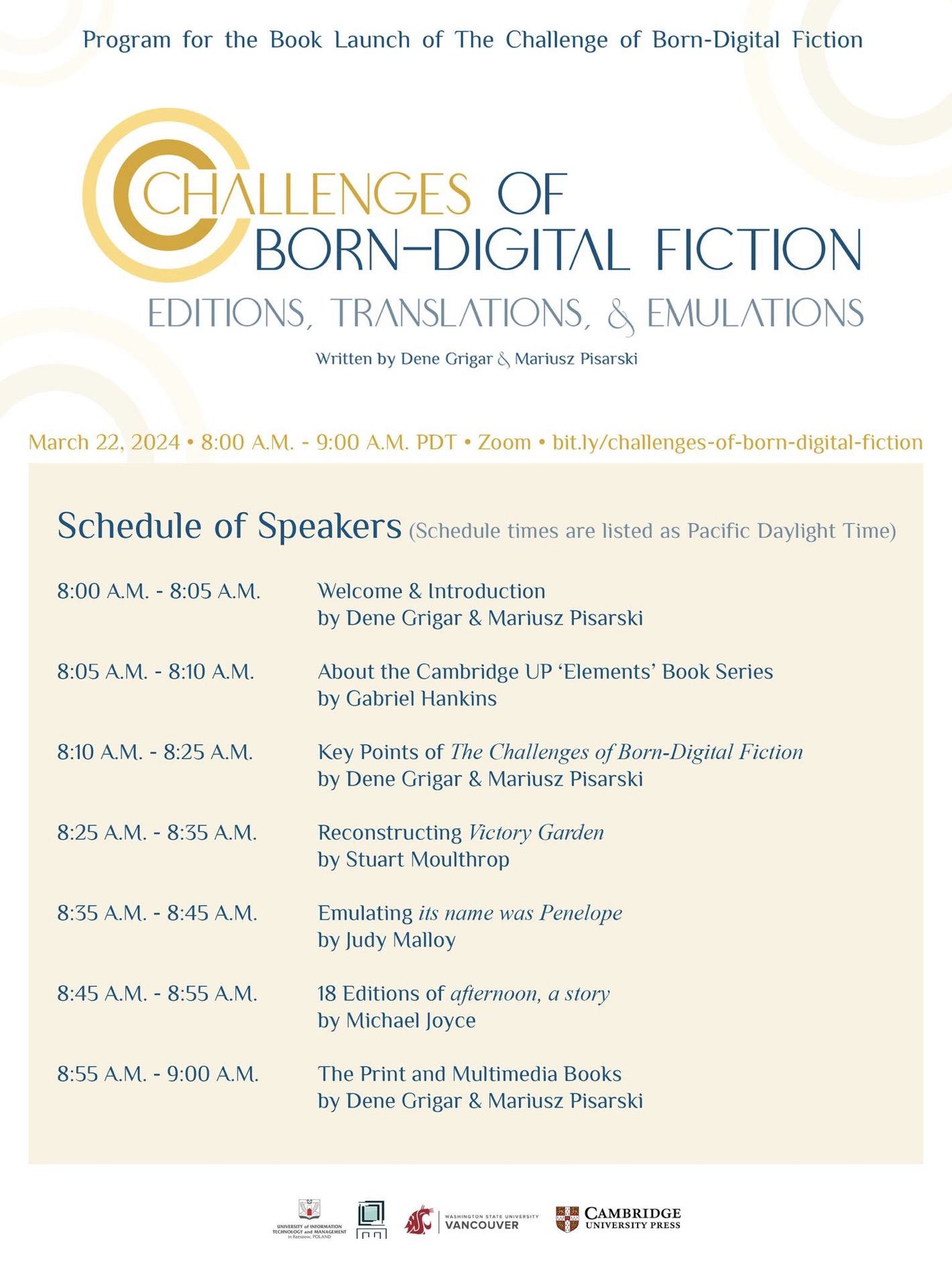DENE GRIGAR, MARIUSZ PISARSKI, and the Electronic Literature Lab invite you to the book launch of “Challenges of Born-Digital Fiction: Editions, Translations, and Emulations" just published by Cambridge University Press. The book is the result of long-term reflection and publishing practice of both authors - in the American context for Grigar and the Polish context for Pisarski - related to born-digital literature.
Electronic fiction and poetry are subjected to dramatic transformations caused by the fast paced development of computer technology and the resulting change in reading practices. A new system, new hardware, a new platform present a new communicative context for the author and the reader. Can the work still be read as it was when it first appeared on a computer screen? Has the arsenal of interactions and the multimedia palette been compromised? Can the work be launched at all? Born-digital literature and art created in the 1980s and 1990s had to face existential challenges multiple times: either transition to a new system and platform or perish. Most often, the authors themselves had to oversee such migration. Today, fortunately, an expanding group of curators, preservationists, and archivists assists in this task. Migration from one digital environment to another takes the form of a new edition, emulation, partial or complete reconstruction, adaptation, and transcreation. All these can be seen as forms of a special kind of translation: a media translation. This is the subject of reflection in Grigar's and Pisarski's book "Challenges of Born-Digital Fiction: Editions, Emulations."

Media translation is the art of transferring individual components of a digital work, with language being just one of them, from the source domain to the target domain. Examples include the pioneering transfers of Judy Malloy's poetic novels from the artistic network the WELL to the DOS system, then to Storyspace format, and finally to the open web environment, the internet Wiki edition of Deena Larsen's hypertext Marble Springs, the Polish translations of Michael Joyce's afternoon, a story and Twilight. A Symphony, as well as contemporary reconstructions of classic hypertexts such as Stuart Moulthrop's Victory Garden or Richard Holeton's Figurski at Findhorn on Acid.
What is the difference between a version and an edition? What are lossy and lossless emulations? Which code layers should be considered in the process of media translation? Grigar and Pisarski address these and many other questions in their book. During the book launch, similar questions will be answered by the book's major protagonists: pioneering authors of electronic literature, among them Judy Malloy, Michael Joyce, and Stuart Moulthrop. The meeting will be held on the Zoom platform, giving everyone the opportunity to participate in this unique gathering of researchers, readers and authors.
It is worth noting that the paper and electronic publication of Cambridge University Press is accompanied by a multimedia companion to Challenges of Born-Digital Fiction: Editions, Emulations created on the Scalar platform. The companion showcases aspects of the book that cannot be transferred to print or ebook editions: videos, 3D and 2D objects, traversals, interview recordings with authors, and an extensive collection of materials documenting the analog and hardware entanglements of electronic literature. Created by the team at the Electronic Literature Lab at Washington State University Vancouver, the multimedia guide is an example of an academic publication that goes far beyond text, and focusing on experiential aspect of reading digital literature.
Ostatnia aktualizacja:
14.03.2024
Cytuj ten wpis jako:
Mariusz Pisarski (2024) Challanges of Born-Digital Fiction. "Techsty" 14.03.2024 [https://techsty.art.pl/akt/Challanges_of_Born-Digital_Fiction.html].
techsty, e-literatura, hipertekst, liternet
